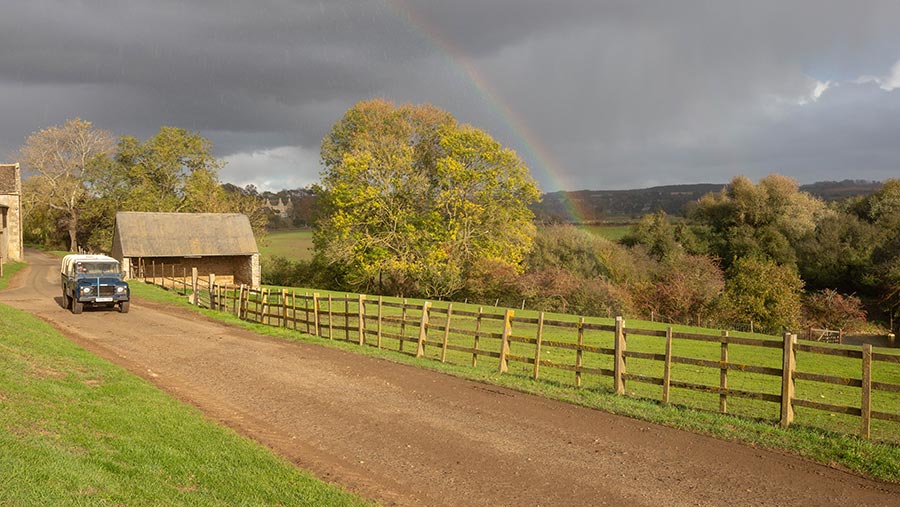What puts land and property buyers off farmland?
 © Tim Scrivener
© Tim Scrivener The most important part of preparing land and property for sale is ensuring everything a potential buyer wants to know is legally documented and presented clearly, say agents.
This includes up-to-date land ownership records, clarifying historic agreements on rights of way and access routes, identifying tenancy agreement terms and end dates, and displaying any responsibilities or liabilities a new owner must take on.
Big issues can arise when such information is vague, and the best bidder is one who is aware of any potential concerns, as they are more likely to complete the sale.
See also: What ‘hidden’ elements of farm ownership can hold up sales?
If a buyer pulls out and the property is put back on the market after being advertised as being under offer, this could prejudice other viewers against it.
Tim Sedgewick, associate at H&H Land and Property, said the firm experienced one case where a misplaced FENSA certificate for the farmhouse windows nearly scuppered the whole deal.
What you can change
While planning consent can be a boon for some purchasers, Mr Sedgewick warns that highly specific or restrictive permissions could be unhelpful, as they leave less flexibility for an incoming owner.
“The local authority may say it can’t be changed or revert back to the original planning application if a new one is submitted,” he said.
Access routes
Access route permissions need to be checked as well. If they’re for agricultural use only, this can affect diversifications and using converted buildings for residential use.
Rights of way
The majority of farmers own their drive but if this is not the case, these rights of way should be confirmed to prevent any disputes at a later date.
Reserved access
Similarly, if a farmer who is selling surrounding land but remaining in the farmhouse requests reserved access, this can discourage buyers.
Overage clauses
Overage clauses, where a seller is entitled to receive further payment if the property receives an uplift in value as a result of planning consent, can make negotiations difficult.
If accepted, crucial decisions such as when the money is payable must be legally documented.
Fixed equipment
Fixed equipment, such as buildings, fencing and grain dryers, should be maintained or improved ahead of going to market, says Duncan Barrie, partner at Galbraith.
Structural surveys will pick up on any property issues and having to pay for improvements could put off buyers or result in a lower offer.
Water supply
Investing in an existing water supply, for both stock and irrigation, is sensible,” said Mr Barrie. “This could be an opportunity to put in a borehole or connect water pipes to more fields.”
Lots
Both over- and under-lotting a holding can cause problems, according to Tom Bishop, associate partner at BCM.
Too many lots can get complicated, with potential buyers overlapping, and not enough lots can put off farmers looking only for land and not the liabilities of additional buildings.
Regs
Ensure planning and building regulations are accurate and available for existing structures and their uses.
Field names
Advertising uncomplimentary field names like ‘Starveacre’ and ‘Thin Ground’ is perhaps not the best idea.
What you might not be able to change
Farmstead
A property with a centrally-placed farmstead will command a premium, said Tom Watson, director at Cundalls, as the owner can control their outlook and enjoy more privacy.
Footpaths
“I would put money on a farm without a footpath reaching a higher price than a comparable unit with one, because people like to feel their holding is safe and can be protected,” said Mr Watson.
Third-party rights
“Similarly, third parties having sporting or mineral rights on the farm can affect sales, as people feel they have less control of the land.”
Contracts
Not being able to transfer or obtain a new milk contract on a dairy farm can pose a problem, as well as not being able to access hill ground for forestry purposes or connect to a defined timber haulage road.
Environmental controls
Land subject to stringent planning or environmental control, such as sites of special scientific interest or National Parks, will be less popular with farmers and could decrease its value.
However, amenity buyers may be more inclined to enter the bidding.
In contrast, the potential of large-scale development or compulsory purchase claims will turn off amenity buyers but could provide opportunities for landowners to strategically sell off parcels and look at new diversification ideas, said Mr Bishop.
Top tips
- Don’t rush into anything and plan ahead.
- Get good professional advice as soon as possible from a land agent, lawyer, and accountant.
- Choose a sensible and realistic guide price.
- Market the diversification opportunities and potential earning capabilities or improvements.
- First impressions are important – keep the property clean, tidy and looking its best during the sale process.
- Know about, and be clear and open about, any potential issues. Make sure there are no skeletons in the cupboard.
- Be prepared to be hands-on for pre-contract enquiries, which can be incredibly detailed.
